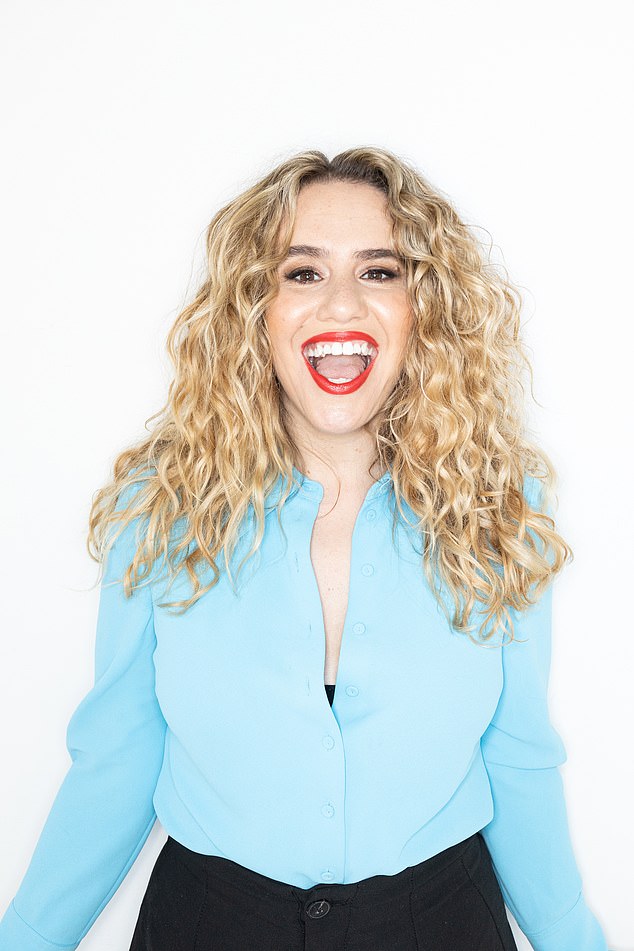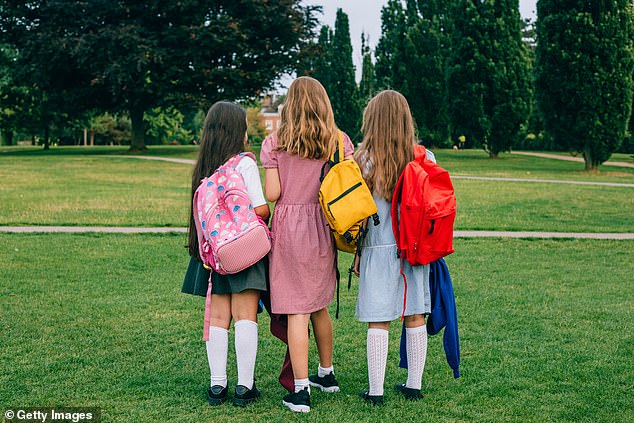Walking home from primary school one scorching hot summer afternoon, my friend turned to me and casually said something that changed the way I saw myself for ever.
I was only 12. Levi and I had been friends for three years; we used to ride our bikes together, sharing jokes and exchanging burned CDs full of Britney Spears hits.
Levi was someone I felt I could be completely myself around. A confident little girl who was silly and loud and obsessively into musicals.
But as we walked home that day, he turned to me and said: ‘It’s a shame we won’t be friends next year.’
I was confused, because we were going to the same secondary school, so I asked him what he meant.
I doubt he meant to hurt me, but his answer hit me like a ton of bricks. ‘I don’t think people will like you in senior school,’ he said.
And that, he told me, meant he wouldn’t be able to be friends with me either, in case I dragged him down with me.
I was too stunned to be angry, or to demand an explanation of why he thought people wouldn’t like me. I just laughed, the way girls and women so often do when they’re trying to protect other people’s comfort at the expense of their own.

Walking home from primary school one scorching hot summer afternoon, my friend turned to me and casually said something that changed the way I saw myself for ever, writes Michelle Brasier

I became obsessed with watching what the other girls were doing. I mimicked their mannerisms, tried on the same frilly dresses they looked so nice in, and wondered why I still felt like an imposter in my own skin
But the impact of that small moment was seismic. For the first time in my life, I felt judged. Different. And really alone.
That night, I sat on my bed and made a list of everything I thought might be wrong with me, along with how I might fix it.
Top of the list was my frizzy hair. Then my big nose. And what about my weight? I was a bigger girl, who’d developed physically way ahead of her peers. Maybe, I considered for the first time in my life, I was just too fat?
I remember feeling horribly exposed – as though a truth about me had been revealed to myself that everyone else had already noticed. And that it made me unlikeable. I felt a fool for not knowing it.
I resolved to shrink myself in every way possible.
I begged my mum for hair straighteners to smooth out my curls. I cut back on food to make myself smaller. I talked less. I tried to take up less space. I also began to mentally edit my personality, constantly checking myself in case I was being too loud, too opinionated, or even too funny.
I started to wonder whether a sense of humour just wasn’t something girls were meant to have.
Eventually, Levi’s voice faded. But a new one took its place: my own internal narrator, who was constantly critiquing me. Seeking to correct whatever it was Levi had seen.
In secondary school, that voice followed me through every corridor. It whispered that everyone was watching, waiting for me to mess up, to say something weird.
I became obsessed with watching what the other girls were doing. I mimicked their mannerisms, tried on the same frilly dresses they looked so nice in, and wondered why I still felt like an imposter in my own skin.
Instead of feeling pretty or grown-up, I just felt awkward and ashamed. My body being so much more developed than theirs meant that in those girly dresses I just looked absurd.
I kept thinking: why can’t I get this right? I remember feeling as though everyone else had the manual for how to be a girl, but that I’d missed the first few chapters.
While I did make friends, I was constantly scared that if people saw through my presentation of ‘normal girl’ to the real me they might not like me after all.
Despite his prediction, Levi and I stayed friends, but I never spoke to him about his comments again; I didn’t want him to know that what he said had upset me.
But I carried the narrative he triggered into adulthood: why do I feel fundamentally wrong? What about me isn’t enough?
I searched for the answers in the mirror and in the Pilates classes I joined, for no other reason than because I noticed that was what other women did. I even made an appointment with a dermatologist and asked her: ‘If this was your face, what would you do with it?’
I carried imagined flaws around with me: my laugh, my body, my very presence and an enduring feeling of being that bit too much.
Eventually, though, something shifted. I started attending a performing arts college at 18, where I discovered that the same weirdness I believed would isolate me became my strength on stage. I’ve since made a career out of performing.
Still, life tested me. In 2007 I lost my dad to cancer a week after his diagnosis. Then in 2013 I lost my brother to colon cancer aged 42. I later discovered from genetic testing that I have a 97 per cent hereditary risk of developing the same kind of cancer.
I carried grief differently to how I had seen it in films. But instead of listening to that little voice and assuming that grief was just another thing I was doing wrong, I decided to share my version of loss. This became my award-winning show Average Bear. I’ve performed it worldwide since 2021 and turned it into a memoir.
Now in my 30s, I thought that, with all this success, surely I was normal. But even then, as I stood on stage with the applause still ringing, I sometimes worried that I’d be found out; that I still wasn’t enough.
And so, in 2023, late one night during the Edinburgh Fringe, I reached out to Levi on Facebook – the first time we’d spoken since school.
I didn’t blame him. It wasn’t about confrontation. I was just tired of hearing his voice – or a version of it – in my head. I needed it to stop.
‘In Year 6, you said something to me that I’ve never forgotten,’ I wrote. ‘I was wondering if I could ask you about it.’
He replied immediately: ‘Of course.’
I didn’t expect such a speedy and warm response. I froze, suddenly feeling I wasn’t ready to have this conversation after all. So I ignored him, leaving the message unread for a whole year.
But then, exactly a year later when I was back in Edinburgh again, I finally found the nerve to pick the conversation back up.
I told him exactly what he’d said, and asked: ‘What was it about me that you thought people wouldn’t like?’
His response shocked me. He said he didn’t remember saying it.
At first, I was stunned. And then I thought, of course he didn’t. It was a stark illustration of the absurdity – and dangers – of dwelling on the unkind, unthinking words of others.
But, he said, he was sorry. He told me that it must have come from his own insecurity. That he was probably intimidated by how confident I was, because he felt anything but himself.
He went on to say that he’d always thought I was smart and funny. Weird but in a cool way. And, just like that, I realised: that throwaway comment had never been about me. It had always been about him.
His honesty was unexpectedly healing.
That conversation changed everything. It made me realise the shame I’d felt all these years hadn’t been mine to carry.
Levi didn’t confirm my worst fears when I finally confronted him; he dismantled them. It’s strange that he had no sense of the power the words he uttered – first when we were children, and now that we were adults – had wielded.
That realisation changed me for the better. As well as being kinder to myself, now I make sure I say kind things to other people as often as possible.
I tell my friends how much I love and respect them, and strangers that I like the dress they’re wearing or how they’ve done their hair. I make a point of telling the people I admire professionally when one of their jokes has made me laugh so hard I wish I’d written it myself.
Because I know how words can haunt us, but also lift us up. And how some can stay with you for decades. So I try to choose the kindest words I can.
I spent my whole life trying to prove that boy wrong. But in the end, he didn’t need convincing that I was just fine as I was. Only I did.
Levi’s name has been changed. Michelle is performing her show It’s A Shame We Won’t Be Friends Next Year at the Edinburgh Fringe Festival from July 30 to August 24 (michellebrasier.com).












